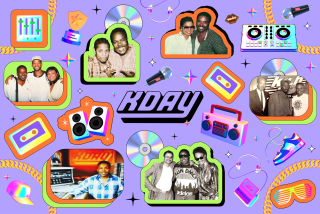RADIO STATIONS TUNE OUT DRUGS
- Share via
NEW ORLEANS — Living on reds, vitamin C and cocaine,
All our friends can say is, ‘ ain’t it a shame.’ “Truckin’,” Grateful Dead
Increasing numbers of radio stations are deciding they get no kick from cocaine, reds or any other controlled substance these days.
Time was when the nation’s radio stations broadcast the youthful cry of “sex, drugs and rock ‘n’ roll” from Woodstock and Monterey to the beaches of Fort Lauderdale and the poolsides of Palm Springs. But today sex is out, and the folks who introduced America to rock ‘n’ roll are joining the rush to crack the grip of the drugs that came with it.
Commercial radio broadcasters meeting at their four-day national convention here last week took whatever opportunities they could to rail against drug and alcohol abuse among Americans.
Included were plans announced Friday by Los Angeles radio personality Rick Dees. The popular KIIS-FM morning drivetime deejay first announced the formation of his BAD (Broadcasters Against Drugs) organization last month, but he carried the issue a step further here when he challenged nearly 5,600 commercial radio stations to show young people that drugs “are not really hip.”
That, he said, is the essential message of Project Awareness--a plan to unite youth-oriented radio stations in a campaign to combat drug abuse.
Key to the plan, Dees said, will be a series of public-service announcements featuring leading popular musicians and on-air comments from deejays reinforcing the belief among young persons that they “don’t have to get high to have a good time.” The campaign is expected to begin reaching the public airwaves after the end of the year.
Teen-agers, Dees said, “take their cues” from what he and other on-air personalities say. “We create and shape the minds of young people.”
The Project Awareness plan is unusual in that it is being launched by a group of deejays and station programmers, the men and women in the radio industry who have long been most closely identified with the popular music that, for decades, has been so intimately tied to drug usage.
In answer to reporters’ questions after his presentation, Dees admitted that he had smoked a marijuana cigarette once when he was 18 years old (he is now 36, married and a father). He acknowledged that radio has contributed to the glorification of drug use by playing records with drug-related lyrics, but he refused to accept any personal or industry-wide responsibility for the national problem.
(Since creating Broadcasters Against Drugs, Dees has also defended the fact that beer companies are among the sponsors of his own radio station. Beer, he has pointed out, can be obtained legally whereas the drugs that he and his fellow deejays are campaigning against are illegal.)
“We reflect the times, really,” Dees told the broadcasters Friday. “I think the days of real drug-related lyrics are waning.”
Project Awareness is the latest in a series of anti-drug and anti-alcohol campaigns waged by broadcasters in recent years. As recently as last spring, some broadcasters heavily promoted a series of drug awareness spots tied to the high school prom and graduation season.
The efforts of the broadcast industry, which is regulated and closely overseen by the federal government, have increased as the White House and Congress have intensified their own anti-drug efforts.
Edward O. Fritts, president of the National Assn. of Broadcasters, the trade group sponsoring last week’s convention, said that the goal of the industry’s efforts is to reach musicians and record producers as much as citizens.
He insisted, however, that broadcasters’ efforts would not result in the actual censorship of lyrics or few hard-and-fast refusals of stations to broadcast popular songs with drug-related lyrics.
“The record companies are going to hear the message,” Fritts said. “Over a period of time, glamorizing, glorifying or even playing drug-related lyrics are going to be very unpopular.”
More to Read
The biggest entertainment stories
Get our big stories about Hollywood, film, television, music, arts, culture and more right in your inbox as soon as they publish.
You may occasionally receive promotional content from the Los Angeles Times.










